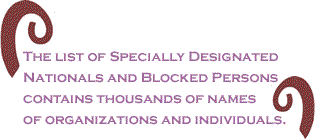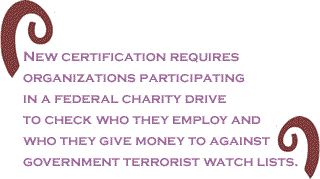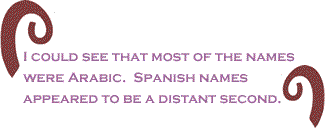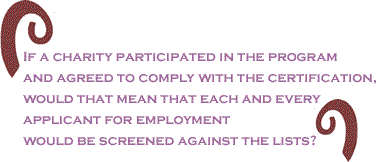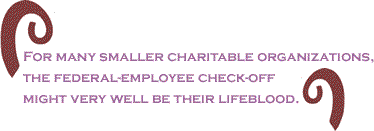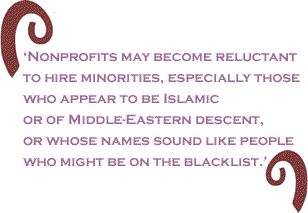
|
|||||||||||||||||||||
 |
In the name of the “war on terror” the Bush administration has upset American businesses and consumers with color-coded alerts and has inconvenienced innocent travelers with unwarranted security checks at airports. Even Massachusetts Democrat Sen. Edward Kennedy, probably one of America’s most recognizable politicians, was stopped repeatedly at airports earlier this year while trying to board planes between Boston and Washington, DC because, according to the August 20 Washington Post, the alias “T. Kennedy” was used by someone on an FBI “no-fly” list. A person on a no fly list is prevented from boarding a commercial airliner or may be subject to interrogation when traveling by air. Now non-profit organizations, also, have become targets for the government’s strong-arm tactics, as a result of a new certification that was put into effect last October, requiring organizations participating in a federal charity drive to check who they employ and who they give money to against government terrorist watch lists. The Combined Federal Campaign (CFC) allows federal employees and military personnel to donate to charities of their choice through payroll deductions. The drive is conducted once a year under a single umbrella. In order to be listed in the CFC’s brochure, charitable organizations must fill out an application certifying that they meet all eligibility requirements to be included on the list. In October of last year the CFC sent a memo to applicants for 2004, informing them that “all charities...must now certify that they do not knowingly employ individuals or have ties to organizations found on any terrorist related list promulgated by the U.S. Government or other international sources.”
The certification refers to three terrorist watch lists: the Department of Treasury’s Office of Foreign Assets Control Specially Designated Nationals and Blocked Persons list, the Department of Justice’s Terrorist Exclusion List, and the list annexed to Executive Order 13224. Links to these documents are provided on the Website of the Office of Personnel Management, which oversees the CFC. The Executive Order lists 27 names of Islamic organizations such as “Al Qaida” and individuals such as “Usama bin Laden.” The Terrorist Exclusion List has 47 organizations, which includes those with leftist, as well Islamic leanings – groups such as “Japanese Red Army,” “Revival of Islamic Heritage Society” and “Al-Hamati Sweets Bakeries” (The U.S. government believes the last, a business located in Yemen, to be a Qaida front). The list of Specially Designated Nationals and Blocked Persons contains thousands of names of organizations and individuals. Quickly scanning through the file that I downloaded to my computer, I could see that most of the names were Arabic. Spanish names appeared to be a distant second. How were charities supposed to respond to the new requirement? The memo said local and national federations (groups of voluntary charitable human health and welfare organizations established for purposes of supplying common fundraising, administrative, and management services to its members) must verify their list of member charities against the published lists. Organizations not affiliated with a federation, the memo said, would be reviewed against the published lists. But nothing in the memo said anything about what charities are supposed to do when they hire people.
The American Civil Liberties Union, on its 2004 application for CFC participation, checked off the certification. However, at a contentious board meeting on July 9, several board members complained of the inconsistency of certifying that it would not knowingly employ anyone on a government terrorist watch list, while filing suit against the use of government no fly lists. In an article in the July 31 New York Times the ACLU’s executive director, Anthony D. Romero, admitted never having consulted the terrorist lists. His argument basically was: if he didn’t know who was on the lists, then he could not “knowingly employ” terrorists. Romero’s claim of willful ignorance on the part of the ACLU was met with an admonition from CFC director Mara T. Patermaster, who said in that same article that “if an organization is found to falsely certify their eligibility for inclusion, they could be ruled temporarily ineligible for inclusion or they could be permanently excluded.” Patermaster, who signed the October, 2003 CFC memo notifying applicants about the new certification, has been head of the CFC since June, 1999. She said that charities were fully expected to review the lists. On the same day that her quote appeared in the newspaper, Romero sent her a letter informing her of the ACLU’s withdrawal from the program rather than accepting her terms.
I took a look at the 2002 Combined Federal Campaign National List – the most recent list of participants publicly available. I placed calls to several organizations that I recognized as supporters of black and liberal causes, including 100 Black Men of America, Association of Black Psychologists, Joint Center for Political and Economic Studies, NAACP Legal Defense and Educational Fund, National Association of Black Social Workers, National Black United Fund, National Conference of Black Lawyers, National Council of Negro Women, National Urban League, Planned Parenthood Foundation, Southern Poverty Law Center and United Negro College Fund. I wanted to know whether organizations had set out specific rules
or guidelines for complying with the certification. Who in With only a few exceptions, I was unable to get through to anyone I could speak to on the matter. Not surprisingly, few for whom I had left messages called me back. One who did, Liselle York, communications director at the Joint Center for Political and Economic Studies in Washington, DC, said that her organization did sign the certification, but it has not hired anyone new this year, so there has been no need to consult the terrorist lists. She said the donation the Joint Center received through the CFC amounted to less than three percent of its budget. The New York-based NAACP Legal Defense Fund directed me to its public relations office in DC, McKinney and Associates. Its response was that the Defense Fund was going “to pass” on the question of the CFC certification, although subsequently it joined the ACLU and 14 other organizations in a coalition, formed in mid-August, to protest the new policy.
J. Richard Cohen, president and CEO of the Southern Poverty Law Center (SPLC) in Montgomery, Ala., said that he really didn’t how his organization was dealing with the change, but his guess was that whoever filled out the application probably checked off the certification without actually consulting any list. “I promise you, it hasn’t gotten to my level,” he said. Anyone who visits the SPLC’s Website can see that it has multiple channels for receiving donations. However, for many smaller charitable organizations, the federal-employee check-off might very well be their lifeblood. Understandably, they would not want to jeopardize their ability to participate in the CFC program by stating that they do not comply with the certification. A friend of mine who works for one of the CFC participating organizations (and who agreed to talk to me on the condition of anonymity) maintained that since smaller charities hire only people known within their network and already perform the requisite checks – through references and other means – there was no need to consult terrorist watch lists. “We’re not going to hire Mousawi,” this person said, referring to Zakariah Mousawi, who the U.S. government claims was an intended 9/11 hijacker and who is now in U.S. custody.
According to my friend, a discussion of the issue with others who worked within some of the more progressive organizations – women’s rights funds, funds for social change – led to the general consensus that the CFC’s certification was a pointless, misunderstood effort to combat terrorism and that it would place an undue burden on organizations. OMB Watch, a Washington-based non-profit that monitors the activities of the White House Office of Management and Budget, issued a statement calling on the CFC to “change its misguided policy.” The group, a participant in the federal fundraising drive and a member of the dissenting coalition of non-profits, says in its statement that following Patermaster’s directive would “force America’s charities to act as police investigators and enforcers... Nonprofits may become reluctant – even if unconsciously – to hire minorities, especially those who appear to be Islamic or of Middle-Eastern descent, or whose names sound like people who might be on the blacklist.” On August 17, Romero wrote an op-ed piece for the Washington Post – including a cautionary anecdote about the ramifications of terrorist watch lists. You see, he – known to family and some friends as Antonio Romero – has the same name as someone on the Specially Designated Nationals and Blocked Persons list. “What if the ACLU had checked my name against the watch lists and found the name of Antonio Romero? If it hired the Antonio Romero targeted by the government, knowingly or not, the ACLU would open itself up to civil or criminal sanctions,” Romero writes. “So the stakes are high.” Indeed. The loss to the ACLU, however, was relatively small – about $500,000 out of their annual budget of over $100 million. And, as my friend speculated, by taking a stand against the CFC’s requirement, the ACLU will probably attract more donations from other sources. It would be easy for any charity accepting funds through the CFC to quietly check off the certification and continue getting the money. They don’t all have a reputation of fighting McCarthyite attacks on civil liberties to protect. But now that Patermaster has thrown down the gauntlet and made the acceptance of CFC donations a question of principle, organizations that support liberal causes are the most likely to suffer. If they follow the ACLU’s lead and bow out of the CFC program, that could leave millions of federal workers and military men and women without an easy, convenient way of channeling money to their favorite charities. Whether charities make hiring decisions based on terrorist lists or not, it’s just one more way the Bush administration has exploited the events of 9/11 to keep its political opponents in line. Patrice D. Johnson is a writer living in New York City. |
| September 2 2004 Issue 103 |
|||||||||
|
|||||||||
|
|
|||||||||
| Printer Friendly Version | |||||||||
 |
|||||||||
 |
|||||||||
 |
|||||||||
| |
|||||||||
| |
|||||||||





















